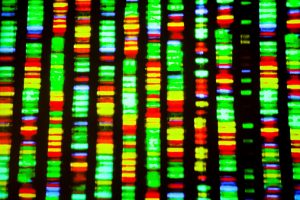 A recent UCL study has highlighted the genes in schizophrenia and obesity to help understand DNA variants that affect the risk of developing both conditions. The researchers analyzed over one million gene variants in over 2,000 research subjects who either had schizophrenia or were obese. Researchers highlighted gene variants which commonly occurred in both schizophrenia and obesity.
A recent UCL study has highlighted the genes in schizophrenia and obesity to help understand DNA variants that affect the risk of developing both conditions. The researchers analyzed over one million gene variants in over 2,000 research subjects who either had schizophrenia or were obese. Researchers highlighted gene variants which commonly occurred in both schizophrenia and obesity.
Lead researcher, Professor David Curtis, said, “Schizophrenia and obesity represent huge public health problems. Both conditions have a substantial genetic contribution, which is at present poorly understood. This study illustrates the way that genetic sequencing technology can help us to make progress in this area.”
Advertisement
MC4R – a gene known to protect against obesity – was not seen in obese subjects. Instead CRHR1 and SNORD115 were seen more frequently. This suggests that if these gene variants do not work there is a higher likelihood of developing obesity.
SNORD115 is located in a region of chromosome 15 that is deleted in Prader-Willi syndrome, which triggers extreme cravings. Both genes have been known to play a role in the body’s metabolic systems, but this is the first time they have been highlighted as playing a role in obesity.
In schizophrenics the gene NLGN2 was seen most often. This gene is responsible for making sure communications between neurons and the brain work properly. This contributes to the notion that schizophrenia may be a malfunction of synapses.
Professor Curtis added, “Genetic research is entering an exciting period. We are now able to study directly the changes in DNA sequence, which alter the code of specific genes, rather than simply studying genetic markers which lie close to genes. This will allow us to understand exactly how changes in this sequence can change the function of molecules in the cell and how this can go on to influence the risk of developing serious diseases. In time this will lead to improved methods of prevention and treatment and we will be able to give patients a better understanding of the causes of their conditions.”
Advertisement
“Genetic sequencing identifies millions of tiny variants in the genetic code between one person and another. Because there are so many variants, it can be difficult to be sure which ones contribute to disease risk. However, as we obtain sequence data for more and more people, we will gradually develop a fuller understanding of the consequences of these variants. For example, we can study the effects of specific DNA variants in cells cultured in the lab and using model systems like this we can test new drugs to try to correct the problems caused,” he concluded.
The findings were published in Annals of Human Genetics.
Source:
http://www.eurekalert.org/pub_releases/2015-10/ucl-gii101415.php
